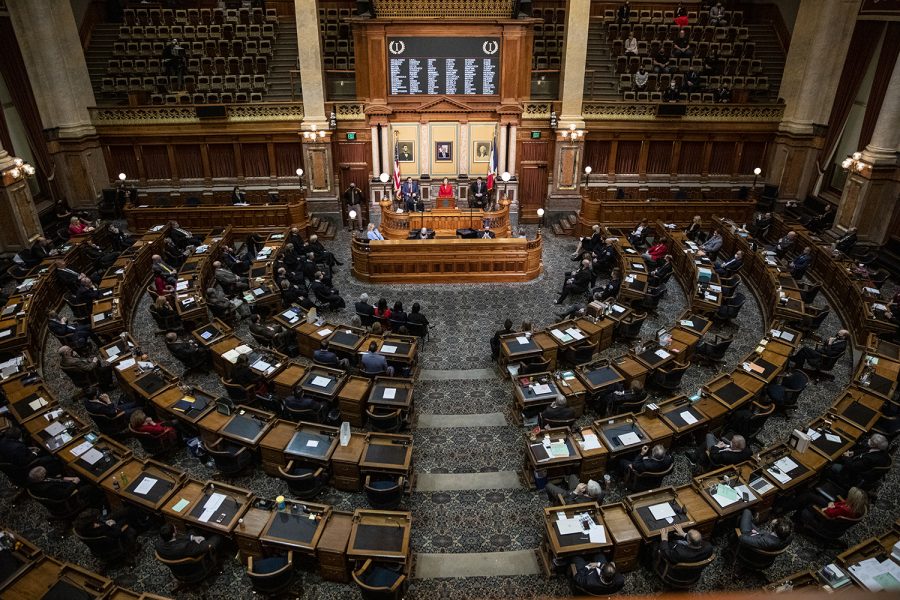Opinion | Iowa needs to commit to social justice reform
The current bills in the Iowa Legislative session are a step back from progress made during the summer.
Gov. Kim Reynolds gives the State of the State address in the house chamber of the Iowa State Capitol on Tuesday, Jan. 12, 2021 in Des Moines. Gov. Reynolds highlighted in the address expansion of broadband internet, a push for in-person learning, and economic recovery from the COVID-19 pandemic.
March 11, 2021
If there’s anything to come out of Iowa’s legislative session, it’s that social justice reform made during the summer wasn’t the commitment we thought it was. While Iowans continue to call for systemic change, legislators now seem set on maintaining the status quo.
Last summer Iowa took its first step toward addressing systemic racism when Gov. Kim Reynolds signed the bipartisan police reform bill. Key components included banning most chokeholds and increasing training for law enforcement.
Unfortunately, this was the only step they decided to take. In the current legislative session, it’s clear that last summer’s bill was more of a performative action instead of a sign of commitment for reform.
Example No. 1 is Senate File 497, which increases penalties for unlawful protests and provides immunity for unintentionally injuring someone with a vehicle in an unlawful protest.
Not only is the bill a slap in the face to peaceful protesters, but it is also unnecessary when 93 percent of Black Lives Matter protests were found peaceful.
And if they are concerned about “unlawful protests,” then why isn’t legislation being introduced to hold officers accountable when tear gas and flash-bangs were used on peaceful protesters using their First Amendment rights?
Example no. 2 is Senate File 243, which adds criminal penalties for people who fail to call authorities in dangerous situations and could widen the racial inequality gap in our police system.
The problem isn’t that the bill is explicitly racist. In fact, Republicans thought it was based on good intentions after no one called authorities for Noah Herring, a 15-year-old Tiffin resident who drowned at the Coralville resevoir.
The problem with this bill is that it’s being created without the consideration of its effects on minority communities and opening the door to opportunities to further exacerbate racial inequality.
Nearly half of Black Americans don’t trust the police to treat them equally. But we can’t expect them to have faith in our police system when history doesn’t give them a reason to. Police brutality instances that happen too often, such as George Floyd and Breonna Taylor, is why racial disparity exists.
It’s no wonder Black Americans would hesitate to associate themselves with a hazardous situation they’re not involved in and not want to call authorities. Now we’re going to punish them for not having trust in a system that has failed them?
Lastly, Senate File 476 expands lawsuit immunity for officers and lets them obtain more information in complaint investigations.
Iowa legislators are too focused on “backing the blue” and are blind to the fact that the force is rooted in systemic racism. We can’t defend and give more power to a system that protects unequally.
We know systemic racism exists in Iowa. Black people are 7.3 more times likely to be arrested for marijuana possession than white people. We know America recognizes this and wants change. Protests occurred in all 50 states last summer.
Legislation shouldn’t be focused on unlawful protests, adding criminal penalties, or “making officers’ jobs easier.” What Iowans have called for is change to at the roots of systemic racism in our police force and the ability to hold them accountable for their actions.
Iowa’s push for these bills makes it clear that the progress they made in the summer wasn’t the commitment we thought it was, and that needs to change. These bills shouldn’t be pushed, and legislation needs to focus on changing our system before we can enforce and protect it.
Columns reflect the opinions of the authors and are not necessarily those of the Editorial Board, The Daily Iowan, or other organizations in which the author may be involved.



